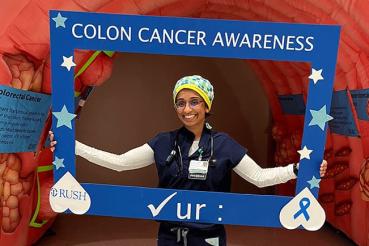4 key things to know about managing this complex condition
Living with ulcerative colitis can be daunting.
This chronic inflammatory disorder of the colon can affect people of all ages, from childhood all the way through adulthood. When the surface lining of the colon becomes inflamed, it causes sores, or ulcers, and creates a whole host of uncomfortable symptoms that can make it difficult to work, spend time with family and enjoy recreational activities.
Don't hesitate to seek help
One of the main reasons ulcerative colitis can be so difficult to live with is the severity of symptoms, which can include crampy abdominal pain, bloody diarrhea and rectal pain.
Since the disease can start at a young age, and since it's a chronic condition, people often live with the symptoms for many years — even decades.
"It's important to pay attention to symptoms and seek medical attention if they are severe or persistent. Teenagers should be encouraged to not ignore the symptoms, to tell their parents or physicians what they're experiencing," says Dana Hayden, MD, a colorectal surgeon at Rush University Medical Center.
The same, of course, is true for adults.
"If something's out of the ordinary — especially if you're seeing blood in your stools, or having persistent loose stools or abdominal pain — talk to your primary care physician or a gastroenterologist as soon as possible," Hayden says. "They can take the proper steps to get a diagnosis for you or your child."
Given these symptoms, doctors will look not only for inflammatory bowel diseases like ulcerative colitis or Crohn's disease, but also benign colon or rectal polyps, or colorectal cancer, all of which can be detected with a colonoscopy.
Pinpointing the cause of your symptoms will enable you to start the right course of treatment — so you can get on a path to symptom relief and feeling better.
Here, Hayden explains four key things to know about treating ulcerative colitis.
1. Managing this complex condition requires a team.
Ulcerative colitis is a complex condition that often requires more than one treatment approach — especially when symptoms are not well controlled.
If you have moderate to severe symptoms, Hayden recommends being seen at a center where specialists work together in teams to address ulcerative colitis.
For instance, Hayden and her colleagues in colorectal surgery work closely with gastroenterologists at Rush. "When symptoms are severe, medications are not working or we suspect cancer, surgery should be discussed as a treatment option, and it's helpful for patients to be able to talk to both a gastroenterologist and a colorectal surgeon," she says.
Knowing all of your options from the start can help you make the best decisions at every stage.
2. Quality of life is an important factor in treatment planning.
When medications aren't working well, or you start requiring more or different medications, your quality of life may suffer.
"If your quality of life isn't good — if you're not thriving — that's when you should have a conversation with your gastroenterologist or colorectal surgeon and ask, 'Is the current conservative approach working for me? Or is it time to look at surgery?' " Hayden says.
Some of the medications and medical treatments are actually so effective at controlling symptoms that they delay the need for surgery, which means it can take a long time to reach the point where you're considering an operation.
But Hayden suggests having a discussion about surgery early on to become educated about it, before it's needed as a last resort.
"Knowing all of your options from the start can help you make the best decisions at every stage," she says.
3. Sometimes surgery truly is the best solution.
Surgery is no small matter, and it's understandable why you may have reservations about it. Surgery for ulcerative colitis means removing the entire colon and rectum, and there are multiple risks associated with the surgery.
The first step is having a conversation about it. If you've had a long-standing history of ulcerative colitis and your symptoms are not well controlled, you don't have to wait for your gastroenterologist to bring up the issue.
In fact, Hayden recommends taking a proactive approach. If you aren't at a hospital where both gastroenterologists and colorectal surgeons are part of your care team, ask your gastroenterologist to refer you to a colorectal surgeon who can discuss all the details of the operation. That way, you and your family will understand what the surgery involves and when it might be right for you.
4. Even if you have surgery, you may not need a permanent ostomy.
Although the idea of having your large intestines removed is scary, it doesn't guarantee that you will need an ostomy — a bag worn outside the body to collect waste that would ordinarily exit the rectum.
If you have good sphincter control and you don't struggle with incontinence, you may be a good candidate for an ileo-anal J-pouch.
With this procedure, surgeons are able to preserve the sphincter, which is essential for pushing out bodily waste. "We use the small intestine to create an internal pouch, forming a 'neo-rectum' so the patient can eliminate through the anus," Hayden explains.
Although this is one of the most challenging operations colorectal surgeons perform, the Rush colorectal surgical team does offer it as a minimally invasive procedure using laparoscopy.
And at times, the team may perform the procedure in stages to give the patient time to get off medications, stabilize their weight and get back to feeling normal.
"Surgery doesn’t promise a perfect quality of life, so I always have honest conversations with my patients about expectations," Hayden says. "I tell them there may still be challenges, but surgery may offer the best chance of relieving long-standing symptoms and helping them get back to doing the things that matter most to them."




